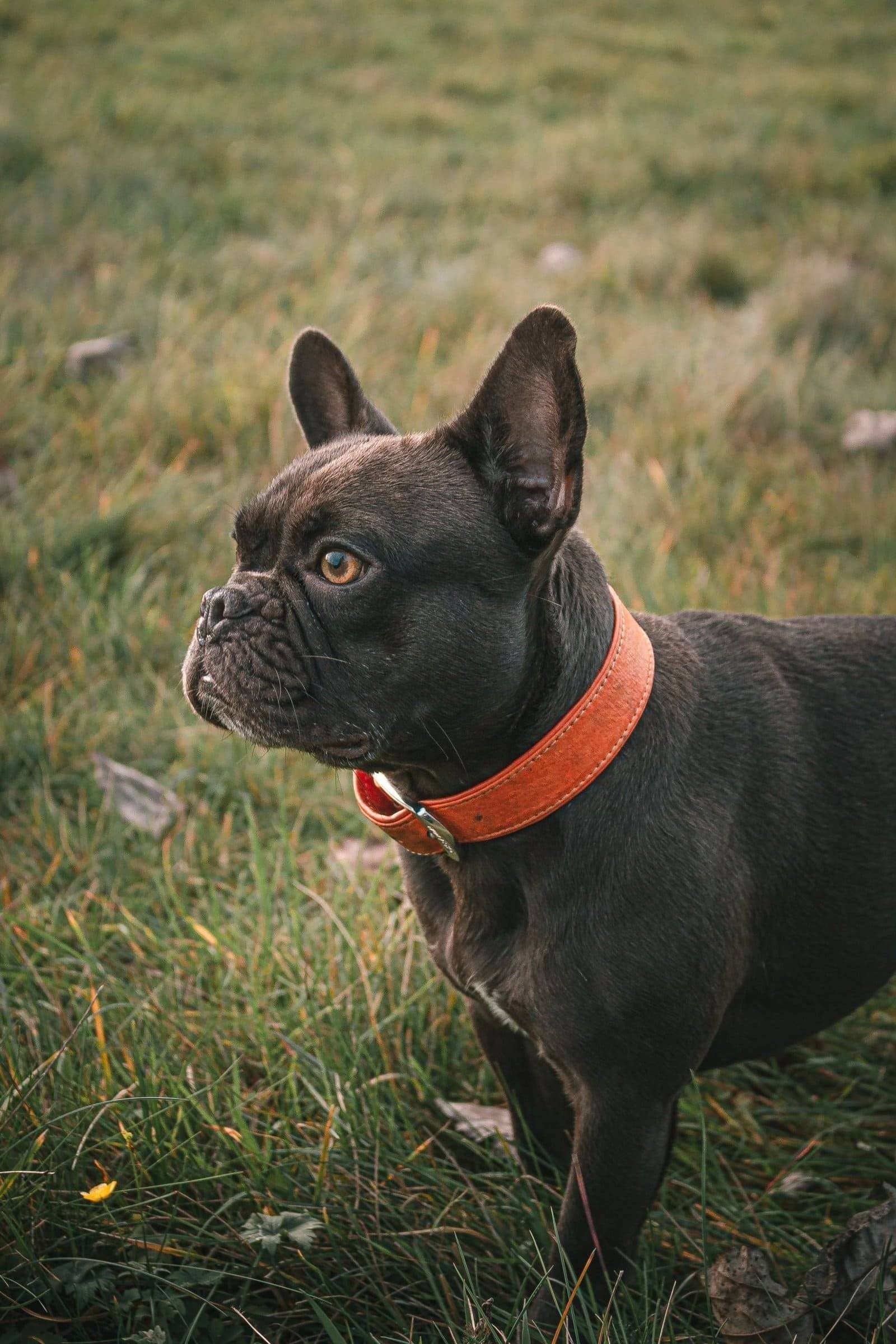The following was written several years ago, and we wouldn’t change much, if anything, except that this wonderful dog breed has become so popular over the past few years that a lot of inexperienced backyard breeders, puppy mills, and scammers have entered the market. This has led to some very poor breeding practices, which have inevitably produced a lot of very poor-quality dogs. Well-bred Frenchies from reputable breeding programs, such as ours, are generally quite healthy and should live long, healthy, and happy lives, bring a lot of joy to their families. Our strong recommendation is to only purchase a Frenchie puppy from an established and reputable breeder who has been in the business for several years, breeds only high-quality males and females with no significant health issues, has DNA tested their dogs for the common Frenchie genetic defects, and has a history of favorable reviews from past clients. If you don’t do this, you are rolling the dice, and if a problem does come up, chances are there will be no one there to help.
Even though the French Bulldog is considered among the healthiest of the brachycephalic (flat-faced) breeds, as with all dog breeds, the Frenchie is susceptible to some genetic and congenital diseases and conditions. We do guarantee our puppies against congenital and genetic problems, as spelled out on our contract, and we will replace or make adjustments for any puppies which have severe health issues as a result of genetic or congenital defects.
Cherry eye (entropion), or inverted third eyelid, has been known to occur in Frenchies, but it is much more common in English Bulldogs and Pugs, and if it does occur, it is relatively easy to correct. We have only one incidence of this in our kennel to date, and we immediately retired her after we had it repaired, before she was ever bred.

Virtually every dog breed, especially those which have white &/or pied individuals in their population, have some degree of congenital deafness, and the French Bulldog is no exception. We have never had a full color puppy with congenital deafness, but we have had a handful of pied puppies which have. The good thing about congenital deafness is that the puppies don’t know that they are deaf, and they usually adapt very well, as the other senses become more acute to help offset the loss of hearing. They are easy to train with hand signals and gestures once you have their attention, and they quickly become integrated into the family. They do well with other pets, children, and adults, and if anything, they are sweeter and milder than their hearing siblings. Of course, they will make lousy guard dogs and they should never be allowed to run loose outside of a fenced in yard due to safety concerns, but otherwise they are much like their hearing siblings. Deaf puppies end up making wonderful pets and we heavily discount them, so they can make a wonderful addition to the family.
Because the Frenchie is a stocky, dwarf (chondrodystrophic) breed, abnormal vertebrae conditions periodically occur. Fortunately, the spine is supported by good musculature, so problems are generally minimized. However, due to the potential for premature degeneration of intervertebral discs, some exercise precautions should be taken, such as limited use of stairs and jumping, especially from heights. However, because Frenchies are such good athletes (at least ours are), it is easier said than done to keep them from over doing it. When ours are outside, they love to run around the yard and tussle with each other, and so far all are in perfect health with no back issues. But, some caution should be used.
Fortunately, Frenchies have relatively low incidence of knee and hip problems compared to many other breeds, but they do occur as they do in virtually all other breeds. When we had Yorkies, luxating patellas (kneecaps that dislocate out of their normal position) were a constant worry. In extreme cases, a fairly simple surgery will correct this problem. In minor cases, generally the dog does fine without surgery. We have only experienced a couple of minor problems with this condition. To date, we have not experienced any problems with hip dysplasia.
Because the French Bulldog is a short-faced (brachycephalic) breed, they are subject to brachycephalic airway syndrome which means that their breathing is less efficient than that of long-nosed breeds (like most of the sporting breeds), so Frenchies have less tolerance to heat, excessive exercise, and stress – all of which increase their need to breathe. Even when Frenchies are comfortable and not under stress, they will breathe more noisily than non-brachycephalic breeds and they will frequently snort and make other interesting noises, including snoring. Because they have much less room in their mouths for their 42 teeth than longer snouted dogs, crooked and overcrowded teeth are common. although they generally don’t present significant health issues.
Occasionally, a Frenchie will have excessively narrow nostrils (stenotic nares – although to an untrained eye all Frenchie nostrils seem very narrow and closed:-). Fortunately, when this does occur there is a simple surgery to correct this condition, which we have done on occasion before sending an effected puppy to its new owners. Also, occasionally a Frenchie will have an excessively elongated soft palate, which will make breathing significantly more difficult. If severe, it will lead to pronounced airway noise, coughing, gagging, retching, and vomiting. This severe condition can also be minimized by surgery, which we will help with in the rare cases that it is necessary.
In any case, all Frenchies should be kept comfortable in hot weather (for example, never left in a parked car) and strenuous exercise should be avoided, especially in warm weather.
We live in Utah, and it often gets into the 90’s during hot summer days. When our Frenchies are outside playing on days like this, they are smart enough to not overdo it. They all have the sense to find some shade and lay down to rest or splash around in the kiddy pool if they get too hot and exhausted, but it is always a good idea to limit their time outside if it is very hot &/or humid.
Our winters can also get very cold, and Frenchies actually handle the cold much better than the heat. Ours love to run around in the yard even on cold days, especially when they can play in the white stuff, but they shouldn’t spend an excessive amount of time outdoors on very cold days. Bring them in where it is warm so they can cuddle with you once they have done their business and have burned off their excess energy.
Another condition which can occur in dogs, especially in brachycephalic breeds like the Frenchie, is pyloric stenosis which is a restriction of the pyloric sphincter, which doesn’t allow partially digested food from the stomach to pass freely into the small intestine, resulting in frequent regurgitation of partially digested food. Virtually all Frenchies, even those with no health issues at all, will occasionally throw up because they do tend to gulp their food and water. However, if the regurgitations are frequent and constant after eating, resulting in lethargy and potentially a loss of weight, it could be due to pyloric stenosis. Fortunately, this condition may only periodically appear, and when it does it can generally be controlled with diet. In some cases, surgery is necessary, but it can generally be done at the same time that a spay or neutering is performed by simply cutting the pyloric band.
In summary, the French Bulldog is a relatively healthy dog breed, probably the healthiest of the bully breeds. Certainly, there are potential congenital problems and precautions that need to be taken due to their bred-in characteristics, but if you provide reasonable care for your Frenchie, he or she will in all probability live a long and healthy life, during which you will be showered with love and laughter. We are aware of several Frenchies which have lived well into their teens, although the average lifespan for a well-bred and well cared for Frenchies is probably closer to a dozen years, although there are certainly diseased and maladies which can cut this lifespan shorter.




